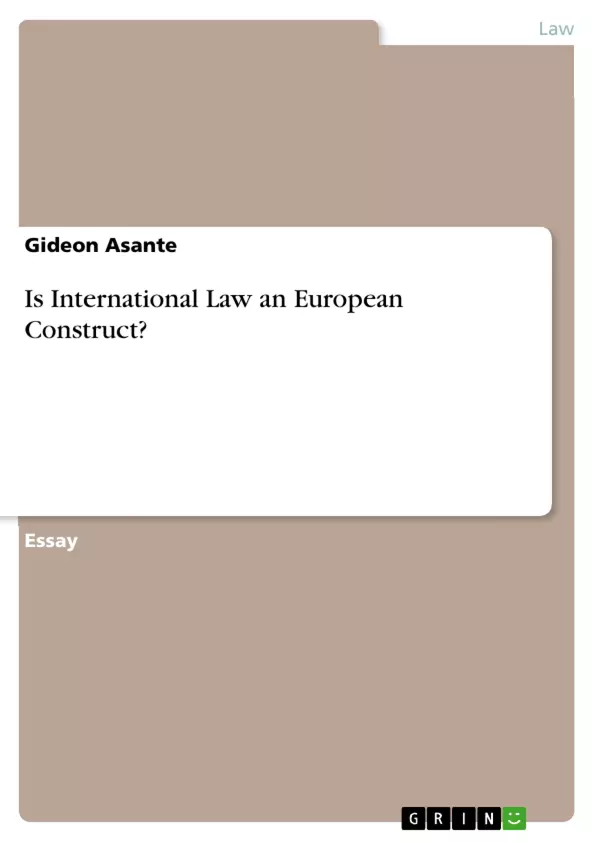The aim of this work is to discuss the view that international law is an European construct, which has no positive benefits for African countries, and as such, the future of international law is one of irrelevance.
The work is divided into three sections. Firstly, the concept of international law, the nature and the sources of international law will be defined. Then the relevance of international law especially to African countries will be discussed. Afterwards three of the loopholes in international law that makes it an European construct will be evaluated. The work concludes with an equitable application of international law on the international scene. The thesis of this work is that international law is without doubt an European construct. It has functioned as a crucial tool to spread European principles during the colonial and post-independence era to the rest of the world while at the same time affirming a universal tone.
Inhaltsverzeichnis (Table of Contents)
- Abstract
- Background to International Law
- Sources of International Law
- Treaties
- Customary Law
- General Principles of Law
- Relevance of International Law
- Creation of International Norms
- Area of international criminal law
- Creation of new cross-border regulations
- Colonial and neo-colonial domination of African countries
- International environmental law and exploitation
- Maintaining economic conditions of African countries
- Conclusion
Zielsetzung und Themenschwerpunkte (Objectives and Key Themes)
This essay examines the claim that international law is an European construct that holds no positive benefits for African countries, leading to the conclusion that its future may be irrelevant. It explores this argument by dividing the discussion into three sections. The first section defines the concept of international law and its sources. The second section investigates the relevance of international law, particularly for African nations. Finally, the third section analyzes three loopholes in international law that support its characterization as an European construct, concluding with suggestions for ensuring equitable application of international law on the global stage.
- The nature and origins of international law
- The impact of international law on African countries
- The argument that international law is an European construct
- The historical context of international law's development
- Potential for equitable application of international law
Zusammenfassung der Kapitel (Chapter Summaries)
- Abstract: Provides a concise overview of the essay's argument, methodology, and key findings. The essay challenges the notion that international law is irrelevant by examining its history, sources, and impact on African countries, ultimately concluding that it is an European construct with potential for equitable reform.
- Background to International Law: This section introduces the concept of international law, explaining its purpose and defining its key sources. The origin of international law is debated, with some scholars tracing it back to ancient times, while others point to its emergence in Europe after the Peace of Westphalia in 1648. The essay highlights the dominant view that international law emerged in Europe, highlighting different epochs of its development, including the Spanish, French, and English ages.
- Sources of International Law: Explores the primary sources of international law, focusing on treaties, customary law, and general principles of law. This section examines the role of treaties in shaping international relations, analyzing how customary law develops through consistent practices of states, and defining general principles of law as those widely recognized by legal systems.
- Relevance of International Law: This section delves into the significance of international law, particularly for African countries. The essay discusses the role of international law in creating new norms, regulating cross-border activities, and addressing challenges like colonial domination, environmental exploitation, and maintaining economic conditions in Africa.
Schlüsselwörter (Keywords)
This essay focuses on international law, its historical development, particularly in the context of European colonialism and its impact on Africa. Key themes include the sources of international law, its relevance to African nations, the argument that it is an European construct, and the potential for equitable application of international law on the global stage.
Frequently Asked Questions
Is international law considered a European construct?
Yes, the essay argues that international law emerged primarily from European history and principles, particularly following the Peace of Westphalia in 1648.
What are the primary sources of international law?
The main sources include international treaties, customary law (consistent state practices), and general principles of law recognized by legal systems.
How does international law affect African countries?
It has been used as a tool for colonial and neo-colonial domination, but it also provides a framework for international criminal law and environmental regulations.
Does international law benefit developing nations?
The essay evaluates "loopholes" that suggest it often maintains the economic conditions of African countries rather than offering purely positive benefits.
Can international law be applied equitably in the future?
The work concludes by suggesting that while it is a European construct, there is potential for a more equitable application on the international scene through reform.
- Arbeit zitieren
- Gideon Asante (Autor:in), 2019, Is International Law an European Construct?, München, GRIN Verlag, https://www.grin.com/document/506496



